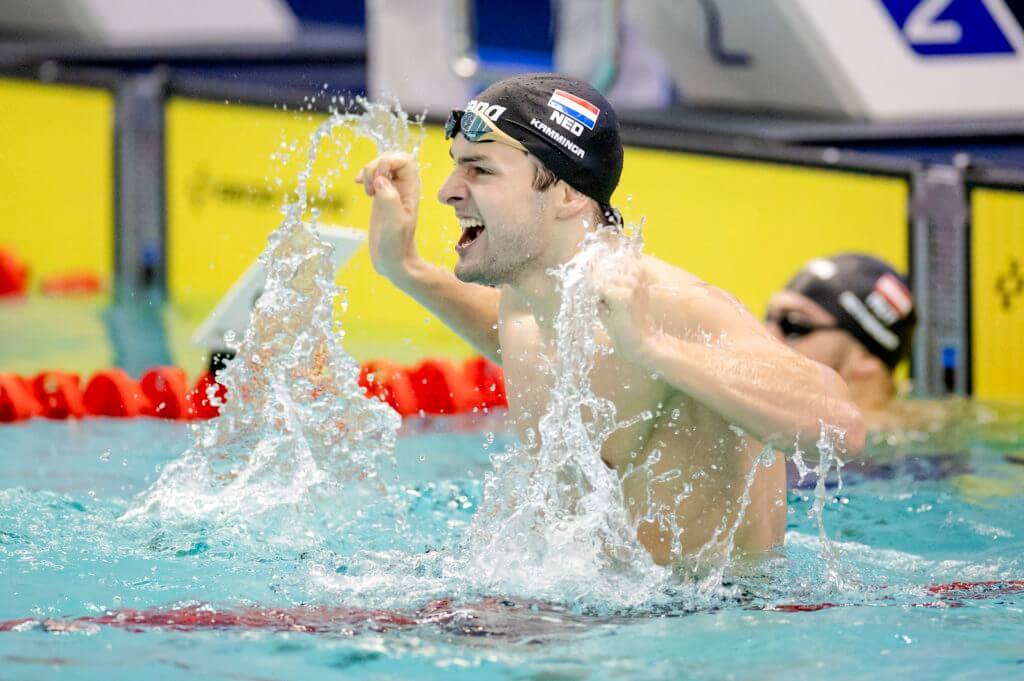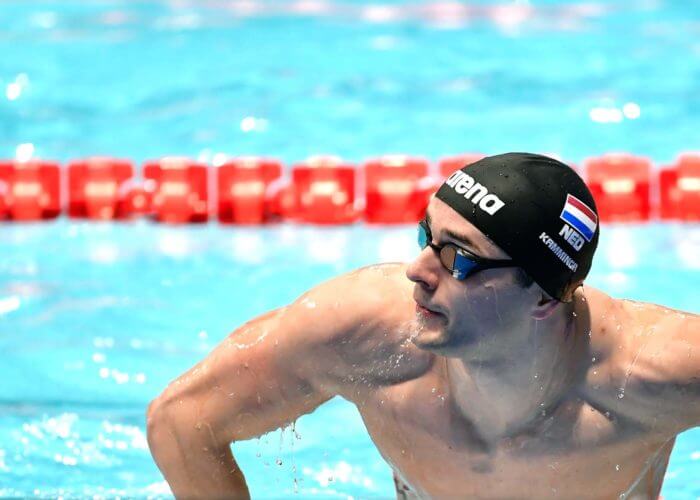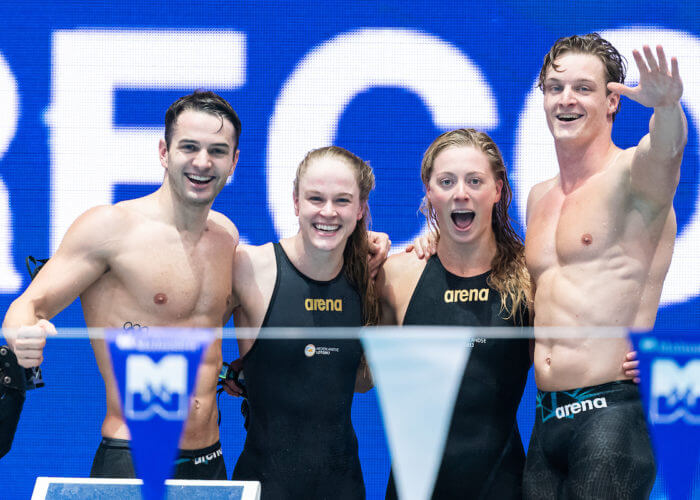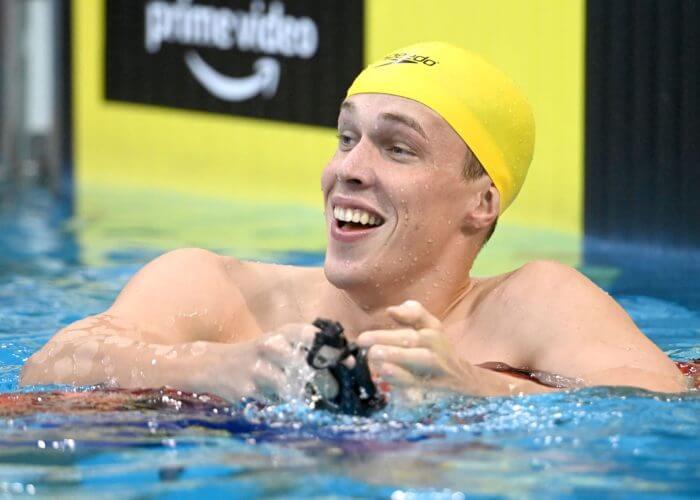World Championships: Arno Kamminga On His Sadness At Adam Peaty’s Absence And The Legacy Of The Pioneers

Budapest was meant to play host to the renewal of rivalries between Adam Peaty, Arno Kamminga and Nicolo Martinenghi for the first time since the trio occupied the 100m breaststroke podium in Tokyo.
Peaty became only the second swimmer to repeat as Olympic champion in the two-length event with victory in Tokyo last year, joining Kosuke Kitajima who won the breaststroke double in 2004 and 2008.
Kamminga claimed silver in both the 100 and 200br to become the first man from the Netherlands to win an Olympic medal in the pool since Pieter van den Hoogenband at Athens 2004 with Martinenghi third to make it an all-European podium.
Just 0.06secs separated the trio’s best times this season, Kamminga on 58.52 ahead of Martinenghi (58.57) and Peaty going 58.58 in only his second meet after Tokyo with the Briton instead competing in the BBC’s ‘Strictly Come Dancing’ and taking time away from the pool.
Nic Fink (58.37) and Michael Andrew (58.51) – who was fourth in Tokyo – leapfrogged the three in the rankings with an intriguing battle in store come 18 June at the Duna Arena.
However, news broke on 11 May that Peaty would not be defending his titles in Budapest after breaking his right foot during training in Tenerife.

Photo Courtesy: Andrea Staccioli / Deepbluemedia / Insidefoto
The devastated eight-time world champion misses out on the chance to make history as the first man to claim four successive global doubles after he won the 50 and 100 breaststroke titles in 2015, 2017 and 2019.
Kamminga is the only man other than Peaty to have broken the 58sec barrier, going 57.90 at the Netherlands trials in April 2021 before cutting a further 0.10 to go 57.80 in the Tokyo heats.
As an athlete who thrives on the battle and intensity of competition against “the big guys”, Peaty’s withdrawal was a source of regret for Kamminga, who described himself as “gutted” – although there is hope the Briton will recover in time for the Europeans in Rome in August.
Kamminga told Swimming World:
“I was most of all just sad: I want to race him. Last year I think I made a great race in Tokyo and in Budapest (at the European Championships) as well.
“I had quite some fun racing him and I hope he did as well. I just wanted to race him against this year: obviously him coming off the dancing and he hasn’t hit the pool in a long time and me trying to take the next step, it would be a very interesting race.
“Sadly because of some bad luck we won’t be able to do it this year at worlds.”
The 26-year-old, who is coached by Mark Faber in Amsterdam, was a regular visitor to the international podium in 2021.
Double Olympic silver in Tokyo was preceded by three visits to the second step of the rostrum at the European Championships in May in the 100 and 200m breaststroke plus the mixed medley relay at the same Duna Arena that hosts this “extraordinary” worlds.
There was gold and silver at the FINA World Short-Course Championships which followed a world record of 1:36.18 in the mixed medley relay at the European showcase among four medals.
The tag of favourite has been attached to Kamminga who laughed as he said:
“I want to have Kamminga as clear favourite even with Peaty but I have to beat him first.
“It’s nice to become world champion but I want to race the best in the world and I want to beat them fair and square.
“That’s where my passion for the sport is, where my love for the sport is and also my respect for my competitors. I know what you need to do, I know what it takes to get to this level.
“Peaty brought it to another level and has been doing it for so many more years. I only have respect for him.
“Of course I want to beat him and of course I want to try and get even on a higher level so hopefully he is there at the Europeans (in August) and we can race and he is also in good shape – that would be a perfect scenario – but for now I’m focusing on myself.”
Kamminga will take on the 100 and 200br as well as the mixed medley relay although there will be no 50br this time out, the Dutchman having a “love-hate relationship” with the shortest race.

Kamminga, De Waard, Toussaint, De Boer; Mixed Medley Relay WR: Photo Courtesy: Giorgio Scala / Deepbluemedia / Insidefoto
No Peaty means there will be a new champion in the 50 and 100 for the first time since 2013 when Cameron van der Burgh and Christian Sprenger took the honours in Barcelona.
Kamminga believes the Briton’s absence will have a psychological effect on some who never had faith in themselves and were beaten before they got on the blocks.
“I think so. I think when he stands on the block – especially the last couple of years – a lot of people just settled with silver, they knew they couldn’t win. That’s not me but I think a lot of other people do that.
“Now he is not there so it’s definitely going to change the perspective of people and they probably see me as beatable so I’m going to prove them wrong.
“It brings a different vibe, a different setting, probably a lot of guys who think they can win now.
“So it is my race now to do just do what I do best – race, swim the fastest I can and I think if I can swim a PB it’s going to be really hard for the others to try and beat me.”
Racing Among Pioneers And The Ripple Effect
Kamminga “couldn’t be more happy” for Zac Stubblety-Cook after he lowered the 200 world record to 2:05.95.
The Australian, who won the Olympic title in a Games record of 2:06.38 last year, was the first man to hit 2:05 and eclipsed Anton Chupkov’s world record of 2:06.12 from the 2019 worlds in Gwangju.
Chupkov, of course, will not be in Budapest with Russia banned from international competition by FINA and LEN until further notice following the invasion and ongoing war against Ukraine.
So too Ilya Shymanovich in the 100br with Belarus also excluded.

Zac Stubblety-Cook, Photo Courtesy: Delly Carr, Swimming Australia
Kamminga is also a member of the 2:06 club, the sixth-fastest man in history in 2:06.85 from Rotterdam in December 2020.
Just as in the 100, Kamminga is racing against a pioneer over four lengths who is taking the event into new territory, something he sees as having a ripple effect in water the world over.
“He is pushing boundaries, just like Adam did on the 100. That’s awesome.
“I see a change already in the Netherlands: when I grew up everybody wanted to be a freestyler because all the top swimmers were freestylers.
“We had Pieter (van den Hoogenband), we had Inge (de Bruijn), we had Ranomi (Kromowidjojo).
“Nowadays more and more people want to become a breaststroker or even another stroke and I think that’s just really good.
“Seeing Adam, seeing me, seeing Zac swimming so fast, it’s good for the sport I think.
“Obviously I want to swim the 2:05 and I want to go in that sub 2:06 but he did it first.
“Really good and now I want to just race him: I haven’t raced him since the Olympics and I struggle doing the 200 on my own nowadays.”
On Target For Budapest After Heavy Workload
Kamminga’s season’s best in the 200 stands at 2:08.22 from Heidelberg in April and he welcomed the opportunity for a spell of intense racing against some of the world’s best including the Japanese delegation at the Mare Nostrum in May.
His preparation has been more gruelling and involved a lot more work than the last couple of years which were impacted by Covid.
He explained:
“Instead of one camp we had two camps which definitely killed me: I’ve never been this tired before but I still swam really good.
“Also my times in competition have been so constant and so high even though I was dead before my race and just tired and my race feels really bad execution-wise.
“But the times are still there so that’s quite nice. Now we finally get some rest and each day I feel better.
“It was fun the last couple of months but now it becomes more fun every single day because it just feels right.”



